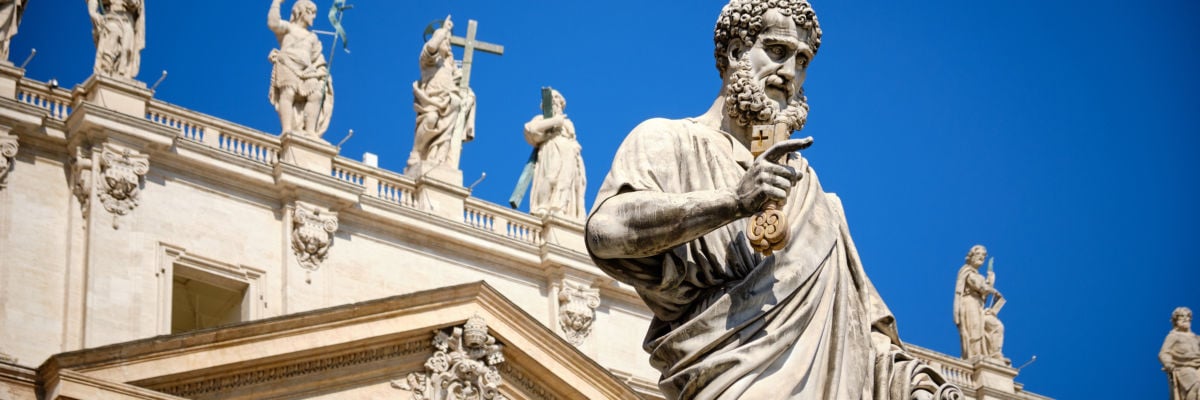
In his classic Life of Christ, Archbishop Fulton J. Sheen notes Peter is mentioned in the Gospels 195 times, while the eleven other apostles are mentioned 130 times total. What was it about this man, an “uneducated, common man” (Acts 4:13)—a fisherman by trade—that would lead our Lord to make him the visible head of the Church on earth?
Fulton Sheen goes on to posit Peter’s natural qualities, including his flaws, as endearing him to our Lord. And I agree. But perhaps it was because of his many flaws that the Lord chose him. Our God tends to choose “what is weak in the world to shame the strong” (I Cor. 1:27). Perhaps St. Peter represents to all of us that there is hope for all of us! We are “the poor and maimed and lame” in our Lord’s famous Parable of the Householder in Luke 14.
Be that as it may, this one thing is certain: Jesus did, in fact, single out St. Peter to be the head of his motley crew of apostles as well as his Church, according to Scripture. Notice that Peter is always listed first in the lists of the apostles (cf. Matt. 10, Mark 3, Luke 6, Acts 1). And he is even called “first” in Matthew 10:2, which, given the context of the multiple lists of apostles—Matthew’s Gospel in particular and the Gospels in general—would seem to indicate “first” (Greek, protos) to mean more than just “first of the list.” Most likely, protos here carries the connotation of “chief,” as protos often does in the New Testament (cf. Matt. 20:27; Mark 9:35, Mark 6:21, etc.).
The Gospels are remarkably clear when it comes to Peter as the “chief” of the apostles. In Matthew 14: 25-32, Jesus empowers Peter to do what no mere man had ever done before or since: walk on water. And when Peter begins to fall, Jesus won’t let him! Our Protestant friends would no doubt object to our “Catholic” understanding of this text as referring to Peter being empowered supernaturally to do what only Jesus can do by nature so that “whatever he binds on earth” will have been bound in heaven because Jesus would not let St. Peter (and his successors) fail.
And I suppose we Catholics would agree if we were limited to this one text. However, this text is followed by Jesus promising “the keys of the kingdom” to Peter alone and promising him, “Whatever you bind on earth shall be bound in heaven” (Matt. 16:19). And then we have the instance of the tax collectors calling on Peter to ask, “Does not your teacher pay the tax?” (Matt. 17:24). In good Petrine fashion, Peter answers for Jesus and gives the definitive “yes,” in the place of Christ. But then notice what Jesus says later in a private conversation:
But that we may not scandalize them, go to the sea, and cast in a hook: and that fish which shall first come up, take: and when thou hast opened its mouth, thou shalt find a stater: take that, and give it to them for me and thee (Douay-Rheims, 26 (27)).
Not only do we have Peter acting in the place of Christ in giving a definitive answer for him, we have Jesus empowering Peter to act in his stead—once again with supernatural power, and, as Archbishop Sheen points out, we have the only time in Sacred Scripture where Jesus uses the first person plural “we” to refer to anyone other than his Father in heaven. In “for me and thee” the “we” is implied, but in the verb “that we may not scandalize them” we have the Greek verb skandalizomen, which is the first-person plural form of the verb skandalizo, revealing an intimacy—and, more importantly, a uniqueness of relationship—between Jesus and Peter unmatched by Jesus’ relationship with any other human person.
And so it goes in Scripture. In Luke 22:29-32, we find Jesus warning all the apostles that if they want to be protected from the attempts of the devil to divide and destroy them, they must remain in union with Peter.
In John 21:15-17, Jesus, in his thrice “Do you love me” series of questions to Peter, hearkening back to Peter’s thrice denial, both heals Peter of his past denials and calls him to shepherd the entire people of God. This fulfills his own prophecy that there would be “one fold and one shepherd” (John 10:16).
In the book of Acts, we see Peter taking the helm of the Church, from his choosing the method of replacement for Matthias (Acts 1) to proclaiming the gospel (Acts 2) and leading the Church to the acceptance of Gentiles (Acts 10-11), to leading the first council (Acts 15) in declaring the truth in a definitive matter concerning a heresy that threatened to tear a fledgling Church apart. And there is much, much more we could consider.
Peter is one of the more fascinating characters in all of Scripture. He is invaluable as a visible sign of as well as principle for the unity of the Church. Without him there can be no unity in the Church as God wills it. But he is also a very important sign of the fact that God chose a weak man for one of the most important tasks the world has ever known.



